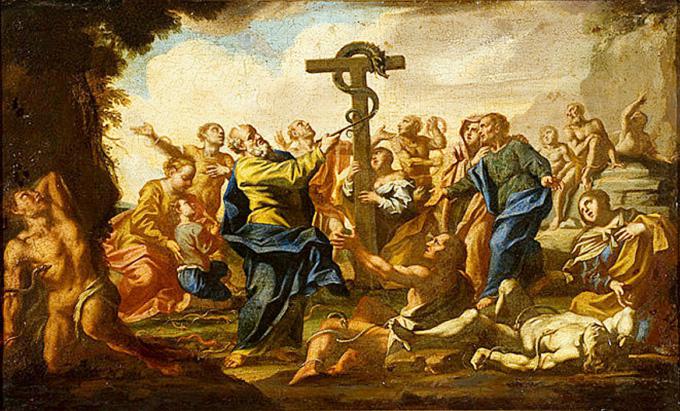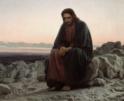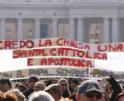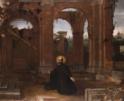
Spirituality

Pakaluk
During the last two weeks of Lent, the Church proposes to us that we meditate on the Passion of Christ.
The week which has just passed is traditionally called "Passion Week," and it culminates in the dramatic reading of the Gospel on "Passion Sunday" (popularly called "Palm" Sunday).
The week which is to come, Holy Week, culminates in Easter Sunday, but only after those three days (the "Easter Triduum") in which we are meant to accompany the Lord in his suffering and death.
There is a remarkable reading at daily Mass in Passion Week. I mean the passage in John's Gospel, where Christ refers to the bronze serpent: "Just as Moses lifted up the serpent in the desert, so must the Son of Man be lifted up, so that everyone who believes in him may not be lost, but have eternal life" (Jn 3:14).
Showing very little gratitude, the Israelites forgot they had been slaves in Egypt. The Egyptians whipped and oppressed them! They also forgot too that God had just helped them defeat the powerful King of Arad in battle. King Arad would have slaughtered the men and enslaved the women! But the Israelites, showing little faith too, grumble about a temporary lack of food and water: "Why have you brought us up out of Egypt to die in the wilderness? For there is no food and no water, and we loathe this worthless food" (Numbers 21:5).
We can easily see ourselves in the Israelites. We are frequently like that. What does God do? He punishes them, as a father punishes a child whom he loves. "Then the Lord sent fiery serpents among the people, and they bit the people, so that many people of Israel died." It is not "the God of the Old Testament" who punishes but, simply, God. We very often pay a penalty for our sins as punishment. We know that that's true.
The Israelites were duly repentant. "We have sinned, for we have spoken against the Lord and against you; pray to the Lord, that he take away the serpents from us." The Church calls this attitude "imperfect contrition." The Israelites seem to be more concerned about the bites of the serpents than the offense which they caused God. (Yes, they "hurt his feelings," because they did not trust him. God is like that, too.)
But imperfect contrition is still contrition. God accepts it and welcomes us back. It's interesting that the Israelites' reconciliation with God, however, was achieved only through the intercessory prayer of Moses: "So Moses prayed for the people." Moses was their mediator. If the Israelites stand for us, then this episode is like a visit to the confessional, where the priest is identified with Christ: "Ego te absolvo."
But here is the most interesting part of the passage: "And the Lord said to Moses, 'Make a fiery serpent, and set it on a pole; and everyone who is bitten, when he sees it, shall live.' So Moses made a bronze serpent, and set it on a pole; and if a serpent bit any man, he would look at the bronze serpent and live."
This is fascinating for four reasons. First, God did not allow graven images as a rule, yet he breaks his own rule, in this special case. Similarly, in the Incarnation he "breaks his rule" against making images, in the sense that Christ, as St. Paul says, is "THE image" of God. The crucifixion is therefore THE image of God's mercy and love.
Second, the Israelites did not have to do anything, to be healed, except gaze at the bronze serpent on the pole. What an extraordinary picture of faith that is! As baptized Christians we have no need to "earn" forgiveness through our efforts. It is enough to have faith in God's chosen instrumentality of forgiveness.
Yet think here of the common common between "religion" and "spirituality. Suppose one of the Israelites were to say, "Oh, I'm not a religious person. I'm a spiritual person. I'll go off on my own and commune with nature and seek forgiveness there, in a spiritual way, rather than follow any rituals of a religion."
That would have been pretty foolish, no? God says, "You only need to look -- but it is important to look at the image which I have set up for you. The means of forgiveness is my choice, not yours."
Similarly, think of how foolish those Catholics are, who suppose they can substitute their own idea of reconciliation with God, in place of sacramental confession, which is God's designated instrumentality for them.
Third, God tells Moses to place on the pole an image of the very serpents who were sent to bite the Israelites. This is strange: how does a cause of evil cure evil? How does a punishment become a gift? "Praised be You, my Lord, through Sister Death!" St. Francis exclaimed. As St. Paul says, "For our sake God made him to be sin who knew no sin, so that in him we might become the righteousness of God." All of the ugliness of sin is exposed on the Cross, and yet it is beautiful too. "By his stripes we are healed."
But the fourth and most astonishing fact about that passage is that it happened at all. Why did God command it, and why was the story preserved, except to prefigure the Crucifixion?
- Michael Pakaluk is Professor of Ethics and Social Philosophy in the Busch School of Business at The Catholic University of America. His book on the gospel of Mark, ‘‘The Memoirs of St. Peter,’’ is available from Regnery Gateway.
Recent articles in the Spirituality section
-
Why is Lent 40 days?Michael Pakaluk
-
The eloquent ambiguity of 'I believe'Bishop Robert Barron
-
You don't get what you pay forMichael Pakaluk
-
The witness of a consecrated lifeBishop Robert Barron
-
What is enlightenment? -- among angels and usMichael Pakaluk























